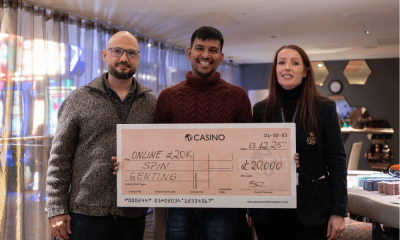BGC
New Report Highlights Potential Impact of Increased Tax and Regulation on UK Betting and Gaming Market

Reading Time: 2 minutes
European countries with higher tax and regulation of their betting and gaming markets are more likely to see increased black market activity, according to a report produced by PwC and published by the BGC.
The study, Impact of the taxation and regulatory environment on European online betting and gaming markets, draws clear links between restrictive policy regimes across Europe and black-market growth.
Countries such as France (57% black market), Sweden (35%) and the Netherlands (37%) have seen large proportions of their gambling markets move offshore.
By contrast, Spain and Denmark, where tax rates are moderate and licensing systems open, maintain higher levels of onshore participation – with only around 11% of gambling taking place outside the regulated sector.
The report reveals that around 5% of all online betting and gaming in the UK now takes place on unlicensed black-market websites. This is equivalent to hundreds of millions of pounds in untaxed, unregulated activity and marks a sharp rise from a previous estimate in 2021, when the black market was thought to account for only 3.3% of total spend.
The report concludes that higher effective tax rates and tighter rules consistently lead to smaller regulated markets, while jurisdictions that liberalise and maintain balanced taxation enjoy stronger growth.
The findings also challenge the assumption that higher gambling duties increase public revenues. Between 2019 and 2024, countries with tax rates below 25% of gross gaming revenue saw annual growth in tax receipts of 13%, compared to 9% in higher-tax jurisdictions.
Operators facing steeper duties typically cut back on marketing and promotions, the analysis found, making licensed platforms less competitive.
The report shows how operators respond to higher regulatory and tax environments by adjusting gross win pricing, reducing bonuses and reducing spending. This makes the player proposition less attractive.
The findings come as the Treasury prepares its Autumn Budget and reportedly considers potential changes to remote betting and gaming duties.
While Britain remains among the world’s safest and most highly regulated gambling markets, the report demonstrates the potential impact of increasing taxes.
Grainne Hurst, CEO of the Betting and Gaming Council, said: “Britain has one of the safest gambling markets in Europe but if the Treasury isn’t careful, we could quickly end up like France or Sweden, with huge black markets contributing nothing in tax, offering zero player protection, and providing no funding for sport or the economy.
“Well-balanced regulation and fair taxes protect players, raise more revenue for the Treasury, and support thousands of jobs. Unlicensed operators do none of those things.”
The post New Report Highlights Potential Impact of Increased Tax and Regulation on UK Betting and Gaming Market appeared first on European Gaming Industry News.
Betting and Gaming Council
BGC: New Budget Would Cause Thousands of Job Losses Across the Entire Betting and Gaming Industry

Reading Time: 2 minutes
The Betting and Gaming Council (BGC) has said that the new budget would cause thousands of job losses across the entire betting and gaming industry.
“The Chancellor’s Autumn Budget has been pitched as good news for horse racing, but in reality it spells thousands of job losses right across the entire betting and gaming industry and represents a major setback not only for that sector but for all the sports our industry supports,” Grainne Hurst, chief executive of the Betting and Gaming Council, said.
“Racing has seemingly been protected from higher betting duties. It sounds like a win, but anyone who understands how the sector operates knows that isn’t true. This exemption is cosmetic. Beneath the surface, this Budget delivers a devastating blow to the very ecosystem that racing relies on.
“What the Chancellor has actually done is impose one of the largest tax hikes on any industry in modern times. Online gaming duty will soar from 21% to 40% in 2026 – a 90% increase. Sports betting duty will rise from 15% to 25% the following year, up nearly 67%. The Treasury expects £1.1 billion a year in additional tax by 2029. These are not harmless revenue raisers; they will fundamentally reshape the market, and not for the better.
“Steep tax rises layered on top of major new regulation will not make gambling safer. They will do the opposite – pushing ordinary players out of the regulated sector, which protects consumers, and into the illegal, unsafe and highly harmful black market, where none of those safeguards exist. This is particularly worrying given that gambling harm in the UK remains low at 0.4%, according to both the NHS Health Survey and the Adult Psychiatric Morbidity Survey. Driving customers into an unregulated black market risks this.
“Even the Treasury predicts a £500m increase in unlicensed activity and has allocated just £26m to counter it. That sum is a drop in the ocean given the scale of the threat, which this very Budget will accelerate.”
The post BGC: New Budget Would Cause Thousands of Job Losses Across the Entire Betting and Gaming Industry appeared first on European Gaming Industry News.
Betting and Gaming Council
BGC: New Tax Measures Could Spark a Sharp Increase in Harmful Illegal Gambling

Reading Time: 2 minutes
The Betting and Gaming Council (BGC) has warned that proposed new tax measures for the UK gambling industry could lead to a significant rise in harmful illegal gambling.
The Office for Budget Responsibility (OBR) admitted that the tax plans will reduce projected yield by around one-third, including £500 million lost by 2029-30 as consumers switch away from the regulated sector and towards the black market.
The OBR also states that around 90% of the duty increases will be passed on to consumers through higher prices or reduced payouts, making regulated products less attractive. It warns this will distort the market and drive more customers towards the illegal black market, where there are no protections, no tax contributions and no safer gambling checks.
Despite these warnings, the Government continues to claim the measures will raise £1.1 billion, a figure that industry experts, independent analysts including EY, and the BGC believe will not be achieved.
Grainne Hurst, Chief Executive of the Betting and Gaming Council, said: “The Government’s own figures show these tax plans will cause significant damage. Industry analysis based on modelling from EY finds that nearly 17,000 high-tech jobs will be lost across online betting and gaming, with over £6 billion in stakes diverted to the black market – a 140% increase in its size.
“These proposals also threaten shop closures, further job losses and a less competitive online market, meaning lower, not higher, long-term tax revenues. They also push more customers to the black market, where there are no protections, no taxes and no safeguards.”
The regulated betting and gaming sector currently contributes £6.8 billion to the UK economy, supports over 109,000 jobs, and provides £4 billion in taxes, including vital funding for racing, sport and tourism. But further tax rises threaten to weaken one of the UK’s most internationally competitive digital industries at a time when the illegal market is expanding rapidly.
The post BGC: New Tax Measures Could Spark a Sharp Increase in Harmful Illegal Gambling appeared first on European Gaming Industry News.
Betting and Gaming Council
BGC Response to the Budget

Reading Time: < 1 minute
Betting and Gaming Council CEO, Grainne Hurst, said: “Massive tax increases for online betting and gaming announced in the Budget make them among the highest in the world, and are a devastating hammer blow to tens of thousands of people working in the industry across the UK, and millions of customers who enjoy a bet.
“Regulated betting and gaming is one of the UK’s few globally successful sectors, generating £6.8bn for the economy, contributing over £4bn in tax and supporting 109,000 jobs, while delivering vital funding for British sport.
“While we welcome the decision not to raise land-based duties and to scrap bingo duty – these excessive online tax increases will undermine jobs, investment and growth across the UK.
“The Government’s Budget is a massive win for the incredibly harmful, unsafe, unregulated gambling black market, which pays no tax and offers none of the protections that exist in the regulated sector.
“These decisions are bad for jobs, bad for customers, bad for sports – and bad for safer gambling.”
The post BGC Response to the Budget appeared first on European Gaming Industry News.
-

 Barbarossa Dragon Empire6 days ago
Barbarossa Dragon Empire6 days agoPeter & Sons Expands Ontario Footprint with Major Casino Time Content Deal
-

 Akshat Rathee6 days ago
Akshat Rathee6 days agoIndian Esports 2026: Strategic Growth and the Asian Games Milestone
-

 16-Reel Slot5 days ago
16-Reel Slot5 days agoMighty Wild™: Gorilla Unleashed – Wazdan Scales New Heights in Jungle Series
-

 Arizona4 days ago
Arizona4 days agoArizona Department of Gaming Reports $44.9 Million in Tribal Gaming Contributions for the Second Quarter of Fiscal Year 2026
-

 California6 days ago
California6 days agoCGCC Gaming Policy Advisory Committee (GPAC) Meeting: Jan 20, 2026
-

 Affiliate Events3 days ago
Affiliate Events3 days agoTaking Off with N1 Partners at iGB Affiliate 2026 in Barcelona: Grand Final and a Helicopter for the N1 Puzzle Promo Winner
-

 Affiliate Management3 days ago
Affiliate Management3 days agoN1 Faces: Daria Maichuk — “Communication as the Key to Strong, Effective Partnerships in Affiliate Marketing”
-

 Brazil iGaming Regulation6 days ago
Brazil iGaming Regulation6 days agoEsportes Gaming Brasil Joins IAB Brasil to Reinforce Responsible Advertising Standards























